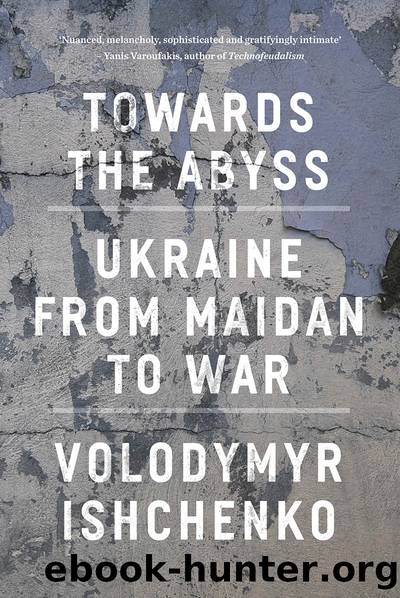Towards the Abyss by Volodymyr Ishchenko

Author:Volodymyr Ishchenko
Language: eng
Format: epub
Publisher: Verso Books
20 March 2022
The world is entering a major political and economic crisis as a result of the RussiaâUkraine war. Any outcome of the war will lead to economic, political and ideological transformations in the post-Soviet space. We can already observe how narratives appealing to the âbrotherlyâ Slavic people or memories of victory in World War II â which have outlived the Soviet collapse by more than thirty years and had wide appeal even in Ukraine, despite post-Euromaidan âdecommunizationâ policies â are now weakening. In the event that the military resistance in Ukraine and the crippling sanctions on Russia lead to the latterâs defeat, such a humiliation would accelerate the collapse of Putinâs regime. Whether via a maidan revolution or, more probably, a palace coup by a faction of the Russian elite, the upshot would be the ultimate failure of a sovereign centre of capital accumulation in the post-Soviet space. Elites in a weakened Russia and other post-Soviet states would reorient towards either the West or China, and would be forced to abandon their competitive advantages in the selective allocations of the state (aka âcorruptionâ).
Removing the Russian sovereigntist pole in the post-Soviet space would reorganize regional politics completely, along with the structure of political alliances in the respective Great Powers. While the US, EU and China would also be re-ideologizing, as the New Cold War between them hardens, the counter-hegemonic responses from post-Soviet societies to their new hegemons might not necessarily be progressive. The longer the war goes on, and the more casualties and destruction that Russiaâs invasion is able to inflict, the greater the chance that Ukrainian state and military institutions will be weakened, which would then strengthen the appeal of radical forces â similar to what happened recently in the Middle East.
If Russia finds a way to withstand the economic blow of intensifying sanctions and internal political destabilisation, it would not be able to rely on escalating dictatorial measures and sheer repression indefinitely. The Russian state would need to buy the loyalty of Russians and subjugated nations through less fiscally conservative and more Keynesian economic policies.7 The ruling elite would need to explain to society what so many Russian soldiers died for, what they killed so many of their Ukrainian âbrothersâ for, what the people have been suffering sanctions for. Instead of the empty rhetoric of âdenazificationâ which has clearly been insufficient to inspire enthusiasm for the war, this would require a more coherent imperialist-conservative project connecting the interests of the Russian elites to the interests of subaltern classes and nations. It would also require stronger political institutions to mobilize active consent for a Russian hegemonic project â a ruling party with massive membership and a popular pro-governmental movement, or their equivalents in the digital age. At the same time, the unavoidable gap between the Russian eliteâs hegemonic claims and its actual policies would open an opportunity for a stronger counter-hegemonic project that would address this disparity. It is possible that once again the weakest link in the imperialist
Download
This site does not store any files on its server. We only index and link to content provided by other sites. Please contact the content providers to delete copyright contents if any and email us, we'll remove relevant links or contents immediately.
Room 212 by Kate Stewart(4113)
The Crown by Robert Lacey(4113)
Endurance: Shackleton's Incredible Voyage by Alfred Lansing(3854)
The Iron Duke by The Iron Duke(3650)
The Rape of Nanking by Iris Chang(3526)
Killing England by Bill O'Reilly(3461)
Joan of Arc by Mary Gordon(3269)
Say Nothing by Patrick Radden Keefe(3069)
I'll Give You the Sun by Jandy Nelson(2846)
Hitler's Monsters by Eric Kurlander(2737)
Shadow of Night by Deborah Harkness(2728)
Margaret Thatcher: The Autobiography by Thatcher Margaret(2688)
Mary, Queen of Scots, and the Murder of Lord Darnley by Alison Weir(2681)
Darkest Hour by Anthony McCarten(2650)
Blood and Sand by Alex Von Tunzelmann(2611)
Red Famine: Stalin's War on Ukraine by Anne Applebaum(2470)
Eleanor & Park by Rainbow Rowell(2399)
The One Memory of Flora Banks by Emily Barr(2350)
Book of Life by Deborah Harkness(2271)
